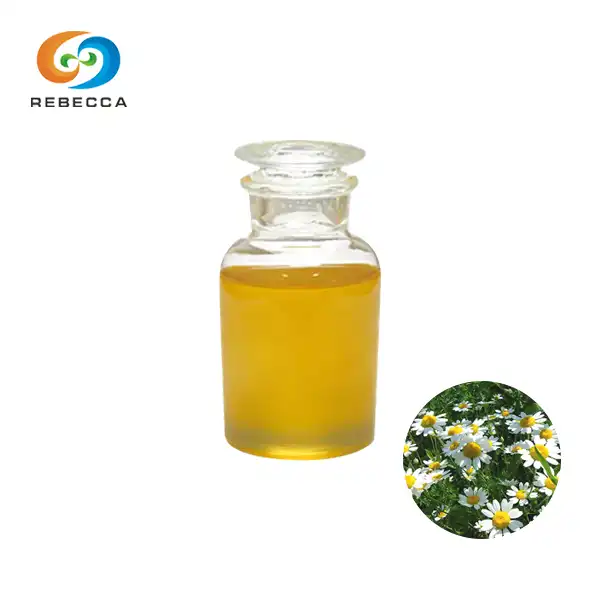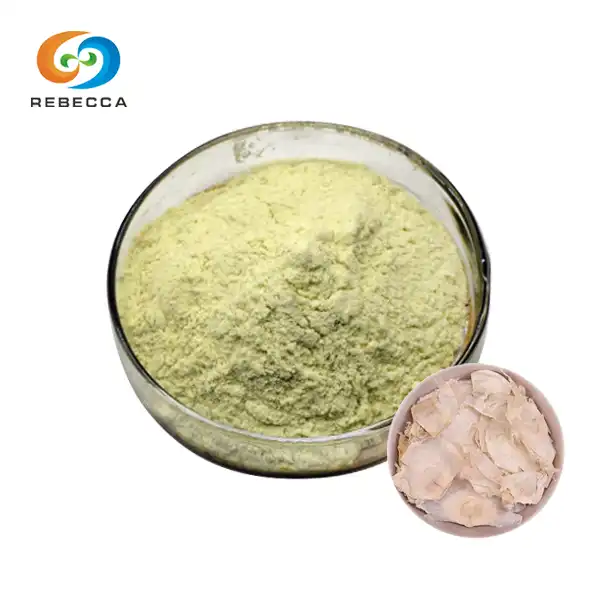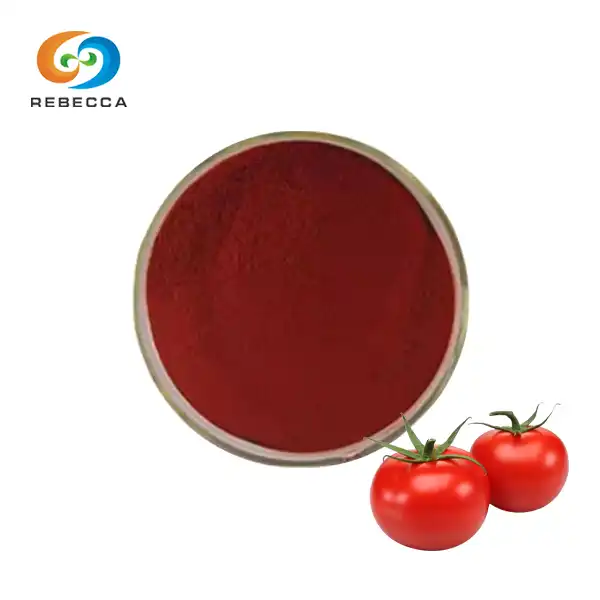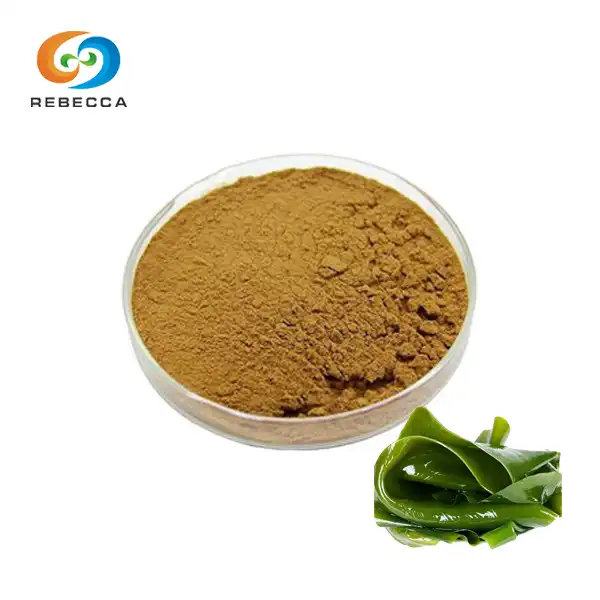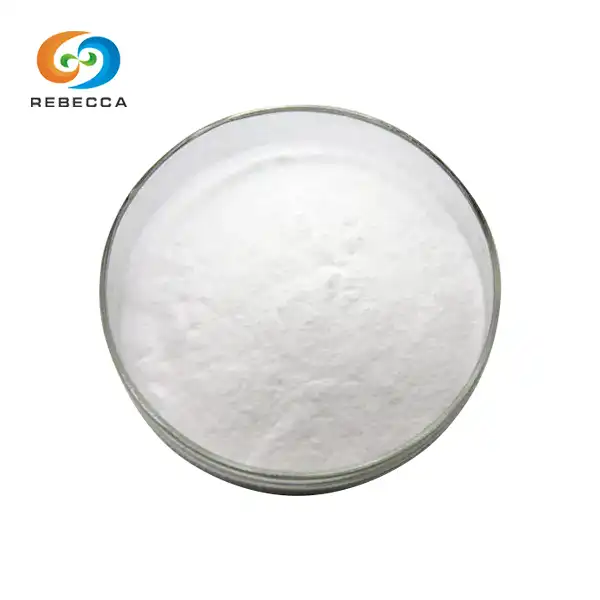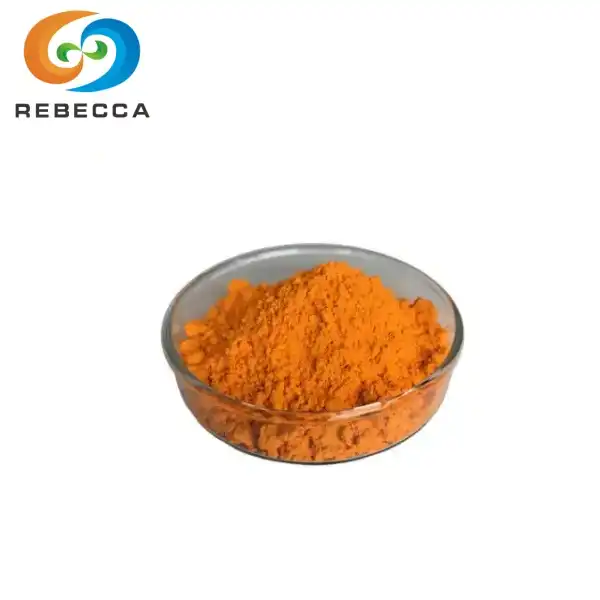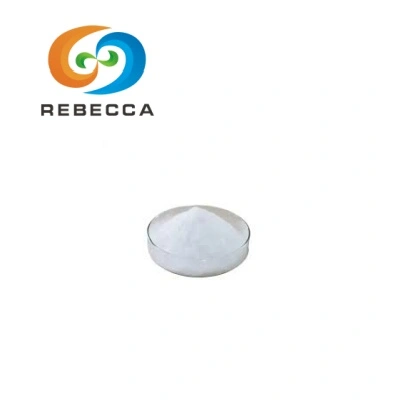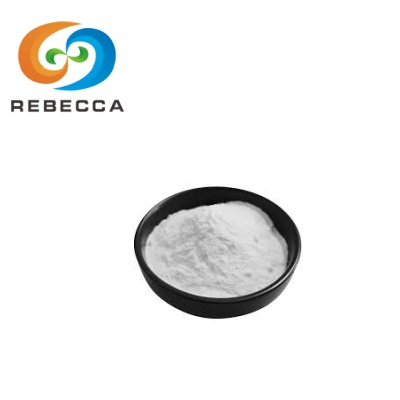Where is alpha ketoglutarate found?
Alpha ketoglutarate (AKG) is a naturally occurring compound found both within the human body and in various external sources. This vital molecule plays a crucial role in cellular energy production and metabolic processes. AKG is primarily produced endogenously in the mitochondria during the Krebs cycle, but it can also be obtained from dietary sources and supplements. Understanding where AKG is found and its diverse applications has become increasingly important for researchers, health professionals, and individuals interested in optimizing their metabolic health and longevity
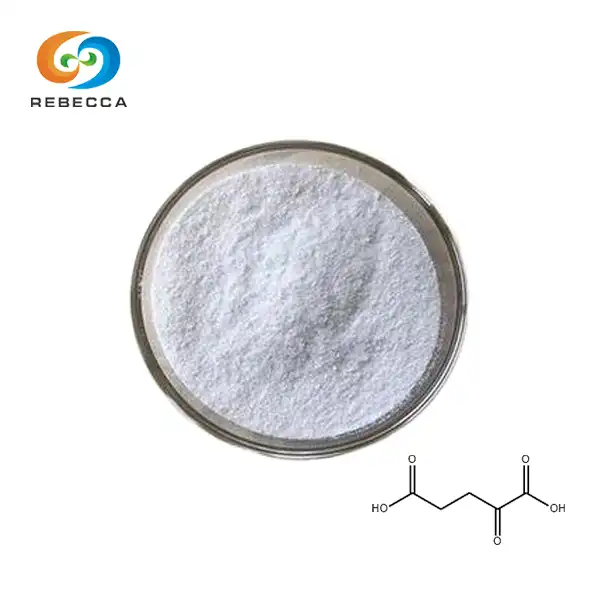
【English name】: Alpha-Ketoglutarate
【CAS No.】: 328-50-7
【Molecular Formula】: C5H6O5
【Active ingredients】: Alpha-Ketoglutarate
【Specification】: Alpha-Ketoglutarate 98%
【Appearance】: White powder
Endogenous Production: Inside the Human (and Animal) Body
The Krebs Cycle: AKG's Vital Role in Energy Production
The Krebs cycle, also known as the citric acid cycle or tricarboxylic acid (TCA) cycle, is a series of chemical reactions that occur in the mitochondria of cells. This cycle is fundamental to cellular respiration and energy production. Alpha ketoglutarate serves as a key intermediate in this process, playing a crucial role in generating ATP, the primary energy currency of cells.
During the Krebs cycle, AKG is formed from isocitrate through oxidative decarboxylation. It then undergoes further reactions, contributing to the production of NADH and FADH2, which are essential for the electron transport chain and subsequent ATP synthesis. The continuous regeneration of AKG in this cycle underscores its importance in maintaining cellular energy balance.
Liver and Kidneys: Major Sites of AKG Synthesis
While Alpha ketoglutarate is produced in various tissues throughout the body, the liver and kidneys are particularly significant sites of synthesis. In the liver, AKG plays a crucial role in amino acid metabolism and ammonia detoxification. It serves as a precursor for glutamate synthesis, which is essential for neurotransmitter production and protein metabolism.
The kidneys also contribute substantially to AKG production, especially during periods of metabolic stress or fasting. In these organs, AKG is involved in maintaining acid-base balance and supporting gluconeogenesis, the process of producing glucose from non-carbohydrate sources.
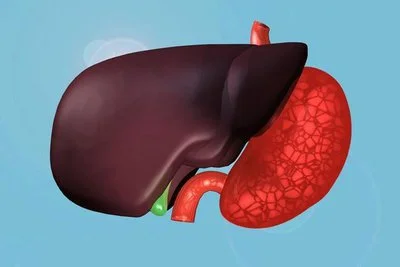
Cellular Metabolism: AKG as a Key Intermediate
Beyond its role in energy production, Alpha ketoglutarate serves as a critical intermediate in numerous metabolic pathways. It acts as a substrate for various enzymes involved in amino acid synthesis, collagen formation, and epigenetic regulation. AKG-dependent dioxygenases, for instance, play crucial roles in processes such as DNA demethylation and protein hydroxylation, influencing gene expression and cellular function.
The versatility of AKG in cellular metabolism highlights its importance not only in energy production but also in maintaining overall cellular health and function. Its involvement in diverse biochemical processes makes it a molecule of significant interest in fields ranging from nutritional science to regenerative medicine.
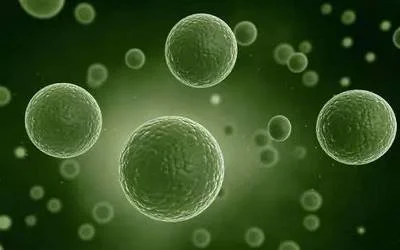
Exogenous Sources: Foods Containing AKG
Plant-Based Sources: Vegetables Rich in Alpha-Ketoglutarate
While alpha ketoglutarate is primarily produced endogenously, it can also be found in various plant-based foods. Leafy green vegetables, such as spinach and kale, are particularly good sources of AKG precursors. These vegetables contain high levels of glutamate, which can be converted to AKG in the body.
Other plant-based sources include cruciferous vegetables like broccoli and cauliflower. These vegetables not only provide AKG precursors but also offer additional health benefits due to their high fiber content and rich array of phytonutrients. Incorporating a variety of these vegetables into one's diet can support natural AKG production and overall metabolic health.
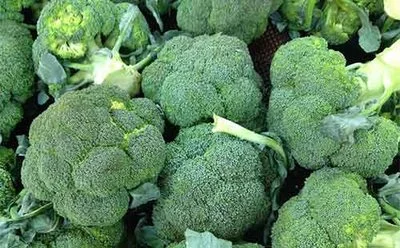
Animal-Derived Foods: Meats and Dairy with Natural AKG
Animal-derived foods also contain notable amounts of AKG and its precursors. Lean meats, particularly poultry and fish, are good sources of glutamine, which can be converted to glutamate and subsequently to AKG in the body. Additionally, dairy products like milk and yogurt contain alpha ketoglutarate in small quantities.
It's worth noting that the AKG content in animal-derived foods can vary based on factors such as the animal's diet and processing methods. Consuming a balanced diet that includes a variety of protein sources can help ensure adequate intake of AKG and its precursors.

Fermented Products: Unexpected AKG Sources
Interestingly, some fermented products can be sources of alpha ketoglutarate. During the fermentation process, certain microorganisms can produce AKG as a byproduct of their metabolic activities. Fermented foods like sauerkraut, kimchi, and certain types of cheese may contain trace amounts of AKG.
While the AKG content in fermented foods may be relatively small, these products offer additional health benefits due to their probiotic content and potential positive effects on gut health. Incorporating a variety of fermented foods into one's diet can contribute to overall metabolic health and potentially support natural AKG production in the body.
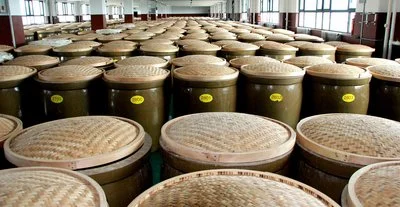
Supplemental Sources: Synthetic AKG
Pharmaceutical-Grade AKG: High-Purity Supplements
In recent years, pharmaceutical-grade alpha ketoglutarate supplements have gained attention in the scientific community and health-conscious individuals. These high-purity supplements are synthetically produced to ensure consistent quality and potency. Pharmaceutical-grade AKG is typically available in various forms, including powders, capsules, and liquid formulations.
The production of these supplements involves advanced manufacturing processes that adhere to strict quality control standards. This ensures that the final product is free from contaminants and meets specified purity levels. Pharmaceutical-grade AKG supplements are often used in research settings and clinical trials to study the compound's potential health benefits.
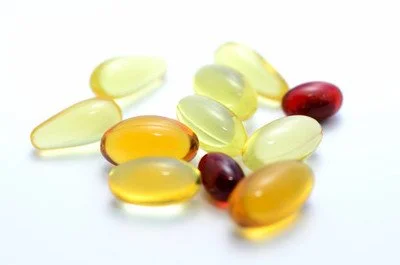
Sports Nutrition: AKG in Pre-Workout and Recovery Formulas
Alpha ketoglutarate has found its way into various sports nutrition products, particularly pre-workout and recovery formulas. In these applications, AKG is often used in the form of arginine alpha-ketoglutarate (AAKG) or ornithine alpha-ketoglutarate (OKG). These compounds are believed to support muscle protein synthesis, enhance exercise performance, and promote faster recovery.
Athletes and fitness enthusiasts often use AKG-containing supplements to potentially improve endurance, reduce muscle fatigue, and support overall athletic performance. However, it's important to note that the effectiveness of these supplements can vary, and more research is needed to fully understand their impact on sports performance.
Anti-Aging Products: AKG's Emerging Role in Longevity
One of the most exciting areas of AKG research is its potential role in promoting longevity and healthy aging. Recent studies have suggested that alpha ketoglutarate may help mitigate age-related cellular decline and extend lifespan in various model organisms. This has led to the development of anti-aging products and supplements that feature AKG as a key ingredient.
These products often combine AKG with other compounds believed to support cellular health and longevity, such as NAD+ precursors or antioxidants. While the research in this area is still emerging, the potential of AKG in anti-aging applications has sparked significant interest in both the scientific community and the wellness industry.
Alpha ketoglutarate is a versatile molecule found both within the human body and in various external sources. Its presence in the Krebs cycle, involvement in cellular metabolism, and availability in certain foods highlight its importance in maintaining overall health. The growing interest in AKG supplements, particularly in sports nutrition and anti-aging products, reflects their potential to support various aspects of human health. As research continues to uncover the multifaceted roles of AKG, its significance in metabolic health and longevity becomes increasingly apparent.

China Alpha Ketoglutarate Supplier
At Shaanxi Rebeccia, we specialize in producing high-quality alpha-ketoglutarate supplements that meet the most stringent industry standards. Our state-of-the-art production facilities employ cutting-edge extraction, separation, and purification technologies to ensure the highest level of product purity and efficacy. We operate under strict GMP and ISO guidelines, implementing rigorous quality control measures at every stage of production.
Our alpha ketoglutarate (CAS No. 328-50-7) is available as a white to yellowish powder with a purity of 99%. The molecular formula is C5H6O5, guaranteeing a pure and potent product for your formulation needs. Whether you're a pharmaceutical company seeking high-purity active ingredients or a health supplement brand looking for functional ingredients backed by clinical evidence, we can meet your requirements.
With our commitment to batch consistency, regulatory compliance, and flexible minimum order quantities, we strive to be your trusted partner in the market. For more information about our products or to discuss your specific needs, please contact us at information@sxrebecca.com.
References
- Krebs, H.A. (1940). The citric acid cycle and the Szent-Györgyi cycle in pigeon breast muscle. Biochemical Journal, 34(5), 775-779.
- Owen, O.E., Kalhan, S.C., & Hanson, R.W. (2002). The key role of anaplerosis and cataplerosis for citric acid cycle function. Journal of Biological Chemistry, 277(34), 30409-30412.
- Wu, N., Yang, M., Gaur, U., Xu, H., Yao, Y., & Li, D. (2016). Alpha-Ketoglutarate: Physiological Functions and Applications. Biomolecules & Therapeutics, 24(1), 1-8.
- Zdzisińska, B., Żurek, A., & Kandefer-Szerszeń, M. (2017). Alpha-Ketoglutarate as a Molecule with Pleiotropic Activity: Well-Known and Novel Possibilities of Therapeutic Use. Archivum Immunologiae et Therapiae Experimentalis, 65(1), 21-36.
- Shahmirzadi, A.A., Edgar, D., Liao, C.Y., et al. (2020). Alpha-ketoglutarate, an endogenous metabolite, extends lifespan and compresses morbidity in aging mice. Cell Metabolism, 32(3), 447-456.e6.
- Cuyàs, E., Verdura, S., Llorach-Parés, L., et al. (2019). Metformin is a direct SIRT1-activating compound: Computational modeling and experimental validation. Frontiers in Endocrinology, 10, 657.
